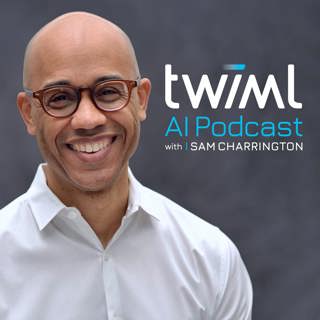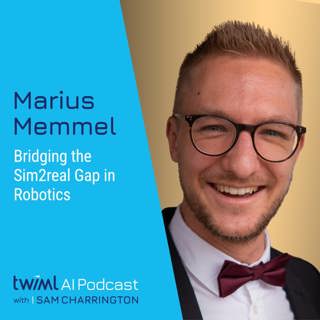
Intel Nervana Update + Productizing AI Research with Naveen Rao And Hanlin Tang - TWiML Talk #31
I talked about Intel’s acquisition of Nervana Systems on the podcast when it happened almost a year ago, so I was super excited to have an opportunity to sit down with Nervana co-founder Naveen Rao, who now leads Intel’s newly formed AI Products Group, for the first show in our O'Reilly AI series. We talked about how Intel plans to extend its leadership position in general purpose compute into the AI realm by delivering silicon designed specifically for AI, end-to-end solutions including the cloud, enterprise data center, and the edge; and tools that let customers quickly productize and scale AI-based solutions. I also spoke with Hanlin Tang, an algorithms engineer at Intel’s AIPG, about two tools announced at the conference: version 2.0 of Intel Nervana’s deep learning framework Neon and Nervana Graph, a new toolset for expressing and running deep learning applications as framework and hardware-independent computational graphs. Nervana Graph in particular sounds like a very interesting project, not to mention a smart move for Intel, and I’d encourage folks to take a look at their Github repo. The show notes for this page can be found at https://twimlai.com/talk/31
5 Juli 201738min

Expressive AI - Generated Music With Google's Performance RNN - Doug Eck - TWiML Talk #32
My guest for this second show in our O’Reilly AI series is Doug Eck of Google Brain. Doug did a keynote at the O’Reilly conference on Magenta, Google’s project for melding machine learning and the arts. Magenta’s goal is to produce open-source tools and models that help people in their personal creative processes. Doug’s research starts with using so-called “generative” machine learning models to create engaging media. Additionally, he is working on how to bring other aspects of the creative process into play. We talk about the newly announced Performance RNN project, which uses neural networks to create expressive, AI-generated music. We also touch on QuickDraw, a project by Google AI Experiments, in which users as Doug describes it, “play Pictionary” with a visual classifier. We dig into what he foresees as possibilities for Magenta, machine learning models eventually developing storylines, generative models for media and creative coding. The notes for this episode can be found at https://twimlai.com/talk/32.
5 Juli 201746min

The Power Of Probabilistic Programming with Ben Vigoda - TWiML Talk #33
My guest for this third episode in the O'Reilly AI series is Ben Vigoda. Ben is the founder and CEO of Gamalon, a DARPA-funded startup working on Bayesian Program Synthesis. We dive into what exactly this means and how it enables what Ben calls idea learning in the show. Gamalon's first application structures unstructured data — input a paragraph or phrase of unstructured text and output a structured spreadsheet/database row or API call. This can be applicable to a wide range of data challenges, including enterprise product and customer information, AI or digital assistant, and many others. Before Gamalon, Ben was co-founder and CEO of Lyric Semiconductor, Inc., which created the first microprocessor architectures dedicated for statistical machine learning. The company was based on his PhD thesis at MIT and acquired by Analog Devices. In today’s talk we are discussing probabilistic programming, his new approach to deep learning, posterior distribution, and the difference between sampling methods and variational methods and how solvers work in the system. Nerd alert: We go pretty deep in this discussion. The notes for this show can be found at https://twimlai.com/talk/33
5 Juli 201742min

Video Object Detection At Scale with Reza Zadeh - TWiML Talk #34
My guest for the fourth show in the O'Reilly AI Series is Reza Zadeh. Reza is an adjunct professor of computational mathematics at Stanford University and founder and CEO of the startup Matroid. Reza has a background in machine translation and distributed machine learning, along with having helped build Apache Spark, and the"Who to Follow" feature on Twitter, which is based on a chapter from his PhD thesis. Our conversation focused on some of the challenges and approaches to scaling deep learning, both in general and in the context of his company’s video object detection service. Our conversation focused on some of the challenges and approaches to scaling deep learning, both in general and in the context of his company’s video object detection service. We also spoke about the advancement of computer vision technologies, using CPU's, GPU's, the upcoming shift to TPU's and we get below the surface on Apache Spark.
5 Juli 201752min

Enhancing Customer Experiences With Emotional AI with Rana El Kaliouby - TWiML Talk #35
My guest for this show is Rana el Kaliouby. Rana is co-founder and CEO of Affectiva. Affectiva, as Rana puts it, "is on a mission to humanize technology by bringing in artificial emotional intelligence". If you liked my conversation about Emotional AI with Pascale Fung from last year’s O’Reilly AI conference, you’re going to love this one. My conversation with Rana kind of picks up where the previous one left off, with a focus on how her company is bringing Artificial Emotional Intelligence services to market. Rana and her team have developed a machine learning / computer vision platform that can use the camera on any device to read your facial expressions in real time, then maps it to an emotional state. Using data science to mine the world’s largest emotion repository, Affectiva has collected over 5.5 million pieces of emotional expression data to date, from laptop, driving, cellular interactions. Understanding the importance of personal privacy, Rana and her Co-Founder Rosalind Wright Picard have vowed to shy away from partnerships that would subject consumers to unknowing surveillance, a commendable effort. The notes for this show can be found at https://twimlai.com/talk/35
5 Juli 201733min

Natural Language Understanding for Amazon Alexa with Zornitsa Kozareva - TWiML Talk #30
Our guest this week is Zornitsa Kozareva, Manager of Machine Learning with Amazon Web Services Deep Learning, where she leads a group focused on natural language processing and dialogue systems for products like Alexa and Lex, the latter of which we introduce in the podcast. We spend most of our time talking through the architecture of modern Natural Language Understanding systems, including the role of deep learning, and some of the various ways folks are working to overcome the challenges in this field, such as understanding human intent. If you’re interested in this field she mentions the AWS Chatbot Challenge, which you’ve still got a couple more weeks to participate in. The notes for this show can be found at twimlai.com/talk/30.
29 Juni 201755min

Robotic Perception and Control with Chelsea Finn - TWiML Talk #29
This week we continue our series on industrial applications of machine learning and AI with a conversation with Chelsea Finn, a PhD student at UC Berkeley. Chelsea’s research is focused on machine learning for robotic perception and control. Despite being early in her career, Chelsea is an accomplished researcher with more than 14 published papers in the past 2 years, on subjects like Deep Visual Foresight , Model-Agnostic Meta-Learning and Visuomotor Learning to name a few, all of which we discuss in the show, along with topics like zero-shot, one-shot and few-shot learning. I’d also like to give a shout out to Shreyas, a listener who wrote in to request that we interview a current PhD student about their journey and experiences. Chelsea and I spend some time at the end of the interview talking about this, and she has some great advice for current and prospective PhD students but also independent learners in the field. During this part of the discussion I wonder out loud if any listeners would be interested in forming a virtual paper reading club of some sort. I’m not sure yet exactly what this would look like, but please drop a comment in the show notes if you’re interested. I'm going to once again deploy the Nerd Alert for this episode; Chelsea and I really dig deep into these learning methods and techniques, and this conversation gets pretty technical at times, to the point that I had a tough time keeping up myself. The notes for this page can be found at twimlai.com/talk/29
23 Juni 201754min

Reinforcement Learning Deep Dive with Pieter Abbeel - TWiML Talk #28
This week our guest is Pieter Abbeel, Assistant Professor at UC Berkeley, Research Scientist at OpenAI, and Cofounder of Gradescope. Pieter has an extensive background in AI research, going way back to his days as Andrew Ng’s first PhD student at Stanford. His research today is focused on deep learning for robotics. During this conversation, Pieter and I really dig into reinforcement learning, a technique for allowing robots (or AIs) to learn through their own trial and error. Nerd alert!! This conversation explores cutting edge research with one of the leading researchers in the field and, as a result, it gets pretty technical at times. I try to uplevel it when I can keep up myself, so hang in there. I promise that you’ll learn a ton if you keep with it. The notes for this show can be found at twimlai.com/talk/28
17 Juni 201752min






















